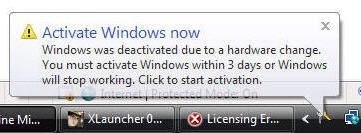With SP1, Microsoft plans to ditch the Vista "kill switch"

The case for Windows Vista Service Pack 1 just got a lot stronger.
When SP1 ships sometime in early 2008, it will strip away one of Vista's most annoying features and remove one of the most persistent objections to Vista's adoption. Microsoft plans to remove the infamous "kill switch" from Windows Vista when SP1 is installed, restoring the Windows Genuine Advantage (WGA) program to its original role as a series of persistent but nonlethal notifications. 
"Based on customer feedback, we will not reduce user functionality on systems determined to be non-genuine"
Those italics are in the original, suggesting that the WGA team has finally realized that they need to react forcefully to a year of embarrassing WGA glitches, server outages, and nonstop customer complaints. Beginning with the final, released version of SP1 next year (the modified WGA code will be missing from all but the most exclusive of SP1 betas), Microsoft plans to roll back WGA to its original format as a series of notifications that nudge and nag but don't block access to any installed programs or Windows features.
The Softies responsible for WGA, including Kochis, wince when they hear the term "kill switch." They prefer a more benign description, reduced functionality mode, when talking about the final step in Vista's progression of penalties for any system that fails to pass its online test of activation status. But as I noted last year:
Microsoft denies that this is a "kill switch" for Windows Vista, even giving it a separate question and answer in its mock interview announcing the program. Technically, they're right, I suppose. Switching a PC into a degraded functionality where all you can do is browse the Internet doesn't kill it; but it's arguably a near-death experience.
In current retail copies of Vista, there are dire consequences for failing to activate a retail copy of Windows Vista after 30 days or ignoring the three-day "grace period" when a system falls out of tolerance after too many hardware changes. When the timer runs out, the desktop turns black and its icons disappear and the Start menu vanishes. You can copy your personal data files, but you can't open them, and you're granted the right to use Internet Explorer for one hour before being forcibly logged off.
In its post-SP1 incarnation, the penalty for ignoring these activation notices is ... more activation notices. The most annoying change is an Activate Now dialog box that forces you to wait 15 seconds before the matching Activate Later option is available to be clicked.
With SP1 installed, a Vista system that fails validation - one that Microsoft calls "non genuine" - will continue to work exactly as before. All programs will run, the Aero interface will keep its transparent window borders and whizzy effects, ReadyBoost will remain enabled, and there won't be any time limit on your user session. If your copy of Windows is flagged as "non genuine," you'll have to deal with some minor annoyances: the desktop background is a solid black (the better to see the "non genuine" label in the desktop's lower right corner). If you change your desktop to something less stark, a scheduled task will paint it black again one hour later, and you'll see a small "Activate Now" alert in the same location, which you're free to ignore.
Restrictions on Windows Update will remain unchanged. If your system is flagged as "non genuine," you'll still get critical security updates, but you'll need to pass a WGA validation check before you can download optional updates and new, signed drivers.
But that's it. Under the new system, you can run Vista indefinitely as long as you're willing to put up with a few nag screens.
The new SP1-era WGA code is designed to detect two of the most common Vista cracks: one tries to fool Vista into thinking that it's an OEM copy with a matching OEM BIOS; the other rolls the mandatory activation checks ahead to 2099 or some other ridiculously distant date. Both the OEM BIOS and Clock Timer hacks are detected when SP1 is installed; the goal, says Microsoft, is to alert innocent or naive consumers who've been ripped off by crooked system makers or who purchased hacked Vista copies from shady online vendors. But even those known fakes will run indefinitely if you choose to ignore the messages.
Microsoft says the new notifications will lead to online "get legal" offers comparable to those for XP:
- Windows Vista Home Basic, $89
- Windows Vista Home Premium, $119
- Windows Vista Business, $145
- Windows Vista Ultimate, $199
Ironically, those prices are significantly better than the retail prices that you'll find from legitimate Windows resellers. In theory, at least, a consumer could install a copy of Windows Vista without a product key, refuse to activate the system for 30 days, and then purchase a perfectly legal license at a discount using Microsoft's online offer.
This drastic change in Microsoft's WGA system is only the latest in series of attempts to smooth WGA's rough edges. In August, Kochis apologized on Microsoft's WGA blog for an outage that incorrectly flagged thousands of customers' systems as "non genuine." In October, Microsoft removed the WGA validation requirement from IE7 downloads. Two weeks ago, on November 20, Kochis promised to "build more trust in WGA" by improving its back-end systems, its response times, and its customer support.
Getting rid of the "kill switch" is a much better way to build that trust.